Dentures
Beautiful & Budget-Friendly Tooth Replacement

Dentures sometimes get a bad rap, but the truth is, they are an excellent form of tooth replacement! They can restore your ability to eat many foods, enhance your appearance, and more. Are they right for you? Book a consultation with Dr. Perez and our team. After a thorough examination, we will help you determine whether this beautiful and budget-friendly tooth replacement is a fit for your unique situation. We look forward to helping you enjoy all the benefits of a recompleted smile.
Why Choose Perez Family Dentistry for Dentures?
- Beautiful, Custom-Designed Prosthetic Teeth
- Friendly & Skilled Dental Team
- Rebuild a Functional Smile
Who’s a Good Candidate for Dentures?

Patients who are missing one, several, or all of their teeth might consider dentures as a viable solution for rebuilding their smiles. With these personalized and lifelike prosthetics, you can be sure to enjoy a natural-looking bite that can last many years with proper care. Keep reading to learn what makes a person a good candidate for dentures and the alternative tooth-replacement options our team can offer if you aren’t eligible for the treatment.
Effects of Missing Teeth

The most common reasons for tooth loss range from tooth decay, periodontal disease, and accidental physical trauma. While some situations are unavoidable, it’s important to practice effective preventive measures to keep future complications at bay, such as having good oral hygiene and scheduling dental checkups and cleanings every six months.
Missing teeth can have devastating effects on your quality of life. You may not be able to eat your favorite foods, and it might be challenging for you to enunciate certain sounds. You may even feel embarrassed to smile. Dentures can help to address all of those issues, reducing any anxieties you might have about things like eating, talking, appearance, and more.
What Qualifies You for Dentures?

Nearly any adult who is missing a single tooth or an entire arch of teeth can be a potential candidate for dentures. Not only are these prosthetics incredibly lifelike and versatile, but the dental technology today has made them even better than in the past. By opting for this tooth-replacement option, you’ll be able to feel much more comfortable and enjoy more natural-feeling results.
The type of prosthetic you’ll receive will be determined by the level of tooth loss that you have. For instance, we might provide you with partial dentures if you’re missing one or several teeth whereas we can rebuild an entire arch with full dentures or even implant dentures. This treatment also comes with a lower upfront cost compared to other solutions, making them a better fit for those working with a budget.
Alternative Tooth-Replacement Options
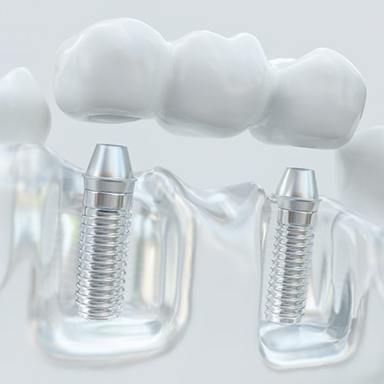
While they are beneficial for many patients, dentures are not the right solution for everyone. You should have healthy gums before starting the treatment process, and your tooth loss should be relatively extensive. If you are only missing a few teeth, another form of tooth replacement may be a more viable option for you. Some alternative treatment options we offer include:
- Dental Bridges: These can be used to replace one to three teeth in a row. The restoration consists of two dental crowns connected by pontics, which are supported by resting atop the adjacent natural teeth on either side of the gap.
- Dental Implants: Our team can place titanium posts into your jawbone to support your chosen restoration, allowing you to enjoy a more natural and stable bite. While the treatment has a higher price, the results can last decades to a lifetime with proper care.
How Dentures Are Made

Like many, you may want to learn how dentures are made before getting them. Fair enough – knowing the design of your new teeth helps you appreciate them. Still, finding the details on denture manufacture isn’t always easy. That’s why Perez Family Dentistry wants to assist. To that end, below is a summary of how dental labs make dentures. Please read it to understand the restorations better. Otherwise, feel free to call our office for more details.
What Are Dentures Made Of?

No matter the type, every denture has a base and artificial teeth. These two parts form the core of the prosthetic. Read on to consider their features:
- Denture Base – In essence, a denture’s base is that which supports its artificial teeth. It’s usually made of acrylic, nylon, resin, or metal. Acrylic is most used for full denture bases, as this plastic can match your gums. Meanwhile, partial dentures may rely on metal clips with an acrylic base.
- Artificial Teeth – Artificial teeth are a denture’s tooth substitutes. As such, they’re crafted from lifelike resin or porcelain. Porcelain is the more popular material due to its lifelike looks.
The Denture Creation Process

Remember, each denture is specially customized for a patient's mouth. That means a dentist follows a multi-step process to make one. In particular, these steps are:
- Step 1: Our dentists will take a dental impression. From there, they’ll make a plaster model that matches the final denture’s size and shape.
- Step 2: Our office will send the plaster model to a lab. Next, lab workers will use it to create a wax gumline.
- Step 3: The lab will set artificial teeth in the wax base. Doing so leads to a prototype denture, which will be used to make the final one.
- Step 4: The wax denture will go to the dentist for a fitting. After testing, it’ll return to the dental lab to finish the final restorations.
- Step 5: A worker will boil the denture to remove its wax. They’ll then place it in a flask. This flask will receive plaster and sit in hot water.
- Step 6: A separator will go into the plaster layer, ensuring the acrylic doesn’t stick. This latter material will be injected into the flask to replace the wax.
- Step 7: The plaster will be removed to reveal the denture. Later, the restoration will be placed in a bath to remove residue.
- Step 8: Excess acrylic will be cut from the denture. Said denture will then be polished.
- Step 9: The patient will have the denture fitted. At that time, the dentist will adjust your denture to work smoothly.
Adjusting to Your New Dentures

Your mouth may feel a bit sore as you start using dentures. In fact, you could have aches and struggle to eat or speak. Such effects are normal and fade quickly. Once you adjust to your new dentures, the prosthetics will feel like your other teeth.
All that said, you can adjust more quickly. One method to consider is exercising your facial muscles. On the other hand, you could eat soft foods for a week. Applying adhesives to keep your dentures in place is also a good move. Whichever approach you pick, it’ll help your dentures feel familiar in less time.
Of course, do call our office if your discomfort persists. Perhaps your denture itself needs adjustment.
Types of Dentures

During your consultation with Dr. Perez, he will evaluate your oral health and the extent of your tooth loss. Depending on his findings, he might recommend that you receive partial dentures, full dentures, or implant dentures. Each type of prosthetic offers its own unique set of advantages.
Partial Dentures
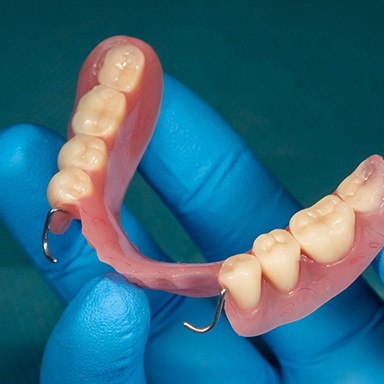

Partial dentures are sort of like a puzzle piece that fits in exactly where it is needed. They work around the existing natural teeth, allowing you to keep any healthy dentition that you still have. Small metal or acrylic attachments help them to stay in the mouth during speaking and eating.
Full Dentures
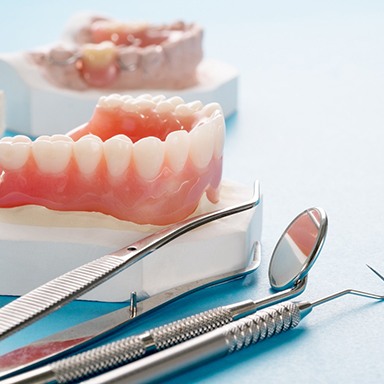

Full dentures replace an entire arch of missing teeth. They typically have an acrylic base along with acrylic or porcelain teeth. Natural suction or a mild adhesive helps them to stay secure on the gums. Their customized fit makes them quite comfortable to wear and use.
Implant Dentures


Implant dentures are secured in the mouth via dental implants, which act as prosthetic tooth roots. Implant dentures are very strong; in fact, they are similar to natural teeth in many ways. For patients whose oral health allows, this is the absolute best treatment to replace many teeth.
The Benefits of Dentures

With custom-fitted, durable, and lifelike dentures, you can be sure to enjoy a wide variety of advantages to your restored smile. Not only will you be able to make the most of a full bite again, but you’ll also appreciate regaining certain abilities that will improve your overall quality of life. These prosthetics are also more affordable than other restoration options, and they’re easy to care for to make the most out of them. Keep reading to learn some of the essential benefits of dentures.
Psychological Benefits

If you’ve lost even a single tooth, you’re more likely to feel uncomfortable with showing your smile. Those who’ve experienced tooth loss typically feel self-conscious about their appearance and may even avoid social interactions due to anxiety or low self-esteem. However, by replacing missing teeth with dentures, you can easily rebuild your lost pearly whites, allowing you to show off a smile you can feel proud of. You also won’t have to worry about certain anxieties, such as your appearance, speech, chewing ability, and more!
Clearer Enunciation

Talking typically involves the use of your teeth. By pressing your lips and tongue against them, you’ll usually be able to pronounce certain words and sounds more easily. Without some or any of your teeth, enunciating your sentences can become extremely difficult or nearly impossible. With dentures, you can essentially replace the necessary teeth so that you can talk more effectively. You might expect an adjustment period, but you can make it easier for you through practice and repetition.
Improves Nutrition

Without all of your teeth, your dietary choices will become limited, especially since some foods are tougher to chew than others. Even fruits, vegetables, and lean meats may be too challenging to digest. If you aren’t able to chew properly, you can end up with problems like indigestion and malnutrition. By wearing dentures to replace your missing teeth, you’ll also be able to expand your diet, allowing you to enjoy more nutritious meals that can improve your jawbone and gum health.
Preserves Oral Health

If you’ve experienced tooth loss, then you may be at an increased risk of dental shifting. This is when your remaining natural teeth begin to move out of place to fill in the gaps in your smile. Dentures, however, can help prevent this from happening, as they can serve as placeholders and support for your existing pearly whites. Your prosthetics can also reduce wear and tear on your smile by distributing the weight of chewing more evenly.
Expands Opportunities

Most people will first notice your smile when meeting you, making a full set of teeth an essential part of first impressions. Not only will you have a complete bite with dentures, but you can also feel more confident showing off your pearly whites. Others can then see how you carry yourself and may perceive you as more outgoing and charming, which can benefit you in both your professional and social life.
Understanding the Cost of Dentures

Are you struggling to decide whether to replace your missing teeth with dentures? Although many factors must be considered when choosing the type of tooth replacement you want, the cost of dentures is likely to be one of the more prominent concerns. The good news is that these prosthetics do not have the same price tag for each patient. This is why you can feel more open to the idea when meeting with your denture dentist. Read more below to find out what our team can do to help you get the smile you deserve at a price you can afford.
Factors That Affect the Cost of Dentures

There are three key factors that you can expect our team to consider when formulating a cost breakdown for you:
- The number of teeth you are missing, as this will determine if you need an upper or lower denture or both
- Whether there are additional treatments required to improve the state of your current oral anatomy so that your dentures remain intact and in place as long as possible
- The materials that lab technicians will use to craft your custom prosthetics
Although some dentists and manufacturers provide cheaper dentures, you’ll discover after meeting with our team that less expensive is not always the best. The reason is that the materials used may not hold up as long as those used by our dental labs. If you want to avoid needing a replacement every few years, we’ll be happy to explain why it’s better to invest in higher-quality dentures.
Are Implant Dentures More Expensive?

Yes, there is no doubt that implant dentures are more expensive, but there is a good reason for it. Instead of purchasing denture adhesives to hold your new teeth in place, these prosthetics fuse with your jawbone after being surgically implanted. Because they offer a more permanent fix as opposed to traditional dentures, they require more invasive and costlier procedures.
Also, because they are affixed to your jawbone, you’re less likely to need replacement, as many implants can remain in place for decades if not an entire lifetime.
Does Dental Insurance Cover Dentures?

When looking at your dental insurance benefits, you may notice that there is available coverage for dentures. This is because most companies view them as essential to helping patients maintain better oral health. You need your teeth to eat and speak, so there is a good chance that your insurer will pay up to 50% of the total cost. However, this is dependent on whether you’ve met your deductible and how much of your existing annual maximum remains.
Other Options for Making Dentures Affordable

If you do not have a private dental insurance plan, there is no need to worry. You can still receive customized dentures and enjoy a healthier, longer-lasting smile with the help of CareCredit Financing. Instead of depleting your savings to pay for this type of restorative treatment, you can enroll in a payment plan that is either low-interest or no-interest. The kind of plan you receive will ultimately be determined by your eligibility. What makes this option so beneficial is that there are no surprise fees, and you can worry less about your payments because of the manageable monthly installments.
Dentures Aftercare

Dentures help to transform both the appearance and function of your smile. However, even if you have few or no remaining natural teeth, this doesn’t mean that you should stop going to the dentist. You should still attend regular checkups for a variety of different reasons. Dr. Perez will continue to monitor any existing teeth and gum tissue. He will also keep an eye out for any abnormalities that could indicate oral cancer. When you have dentures, it is very difficult to notice these changes on your own. Early detection is key to making a full recovery.
Remove After Eating

After eating, you should always remove and rinse your dentures. This helps to prevent the buildup of food debris and plaque. When you rinse your dentures, make sure that the water isn’t too hot. High temperatures can warp the denture material and cause it not to fit properly anymore.
Clean Your Restoration
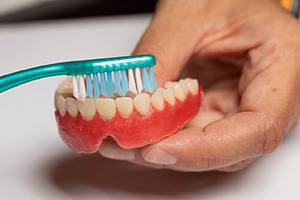
You should remove your dentures when you clean them. Using a soft-bristled toothbrush and a small amount of unscented hand soap, mild dish soap, or denture cleanser, gently brush your dentures. You shouldn’t use regular toothpaste – it is too abrasive for your dentures to handle. If you aren’t going to wear your dentures again right away, put them in a container of water or denture-cleansing solution so they don’t dry out and lose their shape. Thoroughly rinse your dentures before placing them back into your mouth.
Keep Your Dentures Safe
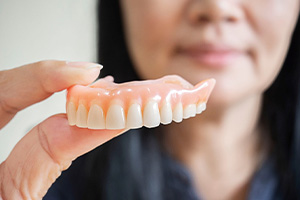
When you clean your dentures, put a towel beneath them just in case they slip out of your hands. This way, they are less likely to become damaged. You should also be mindful of where you store your dentures when you aren’t wearing them. Keep them in a place that is inaccessible to small children and curious pets.
Remove When You Sleep

You should take out your dentures when you go to sleep. Wearing dentures restricts the circulation in your gums and can lead to some tissue irritation. This is the perfect chance to give your gums a break. Overnight, keep your dentures in a glass of water or denture-soaking solution. Allowing your dentures to dry out can cause them to lose their shape.
Notice Changes

You should always be on the lookout for changes so you can address them with your dentist. This includes gum irritation, mouth sores, and signs of infection. If your dentures become damaged, you shouldn’t attempt to repair them on your own. Instead, give us a call so we can help. For dentures that are no longer fitting correctly, don’t hesitate to reach out.
Dentures FAQs

Thanks to dentures, you can once again enjoy the benefits that come with having a complete set of teeth. We want to make the process of getting dentures as easy as possible for you, so if you have any questions, don’t be shy about getting in touch with us to ask. Of course, there are certain questions that we’ve heard more often than others; for your convenience, we have provided answers to some of these inquiries in the following FAQs.
What Is the Average Age for Dentures?
Roughly two-thirds of adults in the age range of 40 to 64 have experienced some degree of tooth loss; in comparison, only a third of adults between the ages of 20 to 39 have incomplete smiles. Additionally, about 57% of people who are 65 to 74 years old wear a denture of some type.
These statistics indicate that the chances of needing dentures tend to increase as you grow older. However, even younger patients may end up getting dentures if they experience some degree of tooth loss.
What Can’t You Eat with Dentures?
During the process of getting dentures, our team will be more than happy to discuss what kinds of foods you will need to stay away from once you receive your new prosthesis. Common examples of foods to avoid include:
- Sticky foods (such as caramel) that might pull your dentures off of your gums
- Foods with small, hard-to-chew pieces (such as popcorn kernels) that might get stuck in your dentures.
- Hard foods (such as raw carrot sticks) that could potentially damage your dentures.
- Tough meats (such as steak) that could put excessive stress on your dentures and the rest of your mouth due to the amount of chewing involved.
Can I Use Regular Toothpaste to Clean My Dentures?
It’s generally not a good idea to use toothpaste on dentures. While it may not seem like it would cause much harm, the abrasive nature of toothpaste means that it could end up damaging your dentures significantly. It’s better to clean your dentures with nonabrasive cleaning materials like hand soap or a mild dishwashing liquid. Note that if you use a toothbrush for the cleaning process, it should have soft bristles that won’t be too hard on the prosthesis.
Can I Sleep with My Dentures?
With the exception of the first 24 hours, you should always take your dentures out in the evening before you go to bed. Even if your dentures are generally comfortable, they still put pressure on your gums and affect blood circulation; as such, wearing your prosthesis for too long could result in significant soft tissue irritation. On top of that, bacteria can thrive in the dark, moist space under dentures, potentially putting you at risk for pneumonia. In short, while it may seem more convenient to leave your dentures in when you go to bed, it’s simply not worth the long-term consequences.
